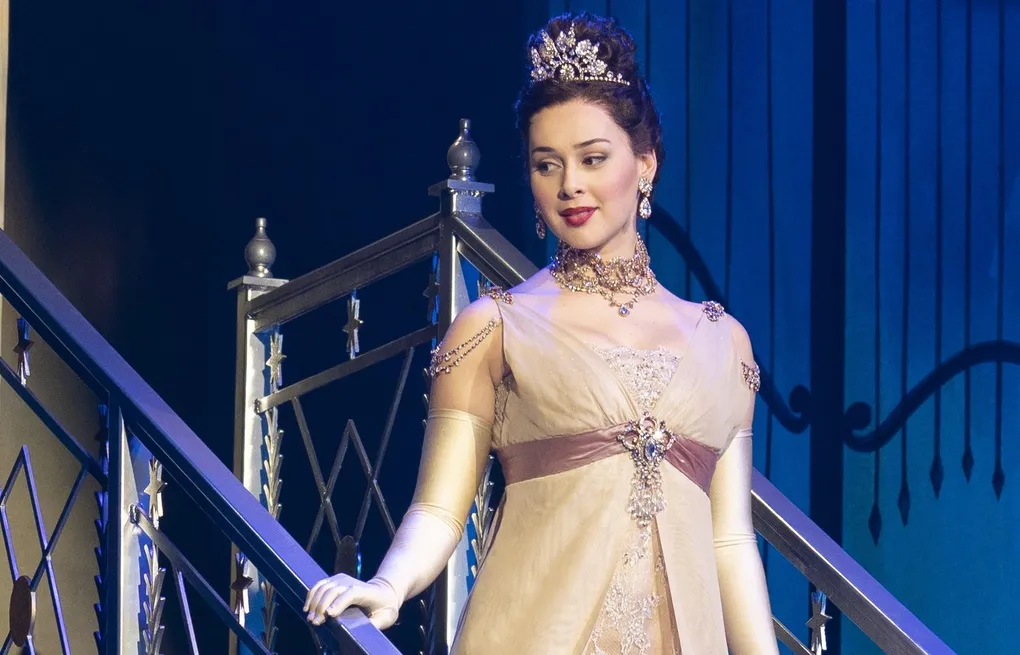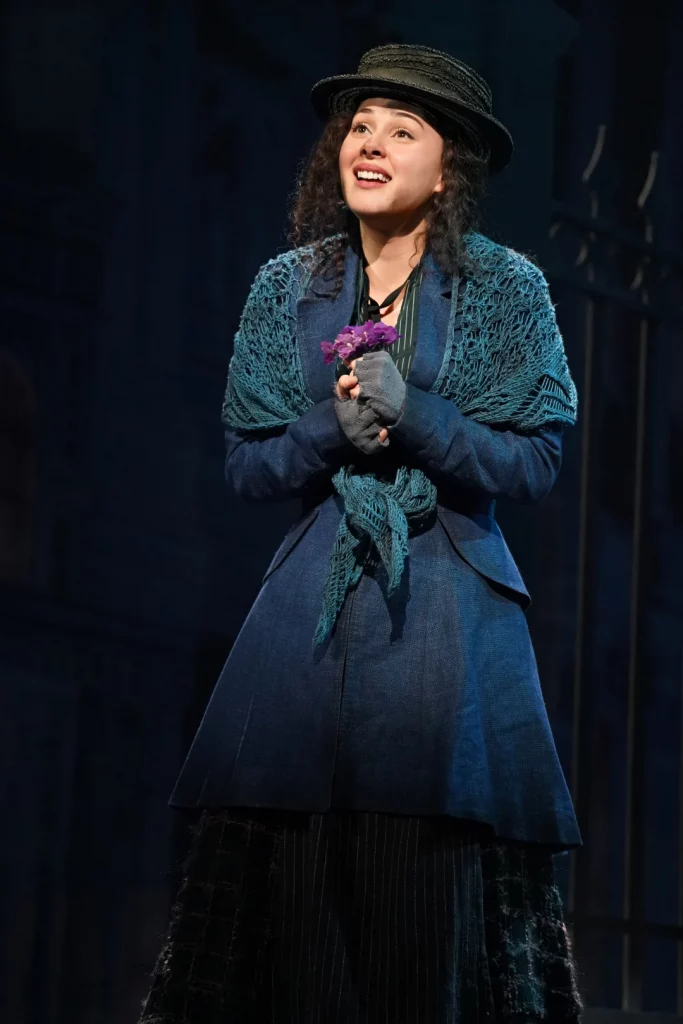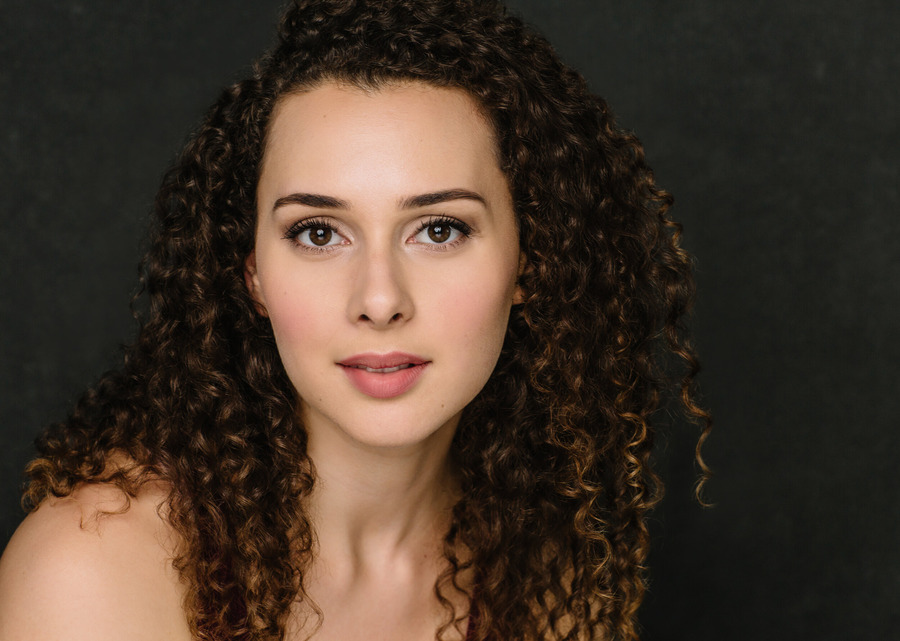Dedicated community theatre artists can relate to the artistic plights of Alfie Byrne. By day, Alfie is a Dublin bus driver. By night, he is the director of an amateur theatre troupe, determined to stage Oscar Wilde’s Salome.
Of course, as the central character in A Man of No Importance – the musical by Stephen Flaherty, Lynn Ahrens, and the late Terrence McNally, based on the 1994 Albert Finney film of the same name – Alfie has internal conflict to work through, as well. He and others wrestle with questions of identity, acceptance, and the weight of keeping secrets in a tight-knit community. It’s the making of art that brings them together.
“You don’t have to be an ‘artist’ to be an artist,” noted actor Shereen Ahmed. This fall, under the direction of John Doyle, Ahmed portrays Adele opposite Jim Parsons’ Alfie in Classic Stage Company’s revival of the musical. “To use the show’s words, you can be ordinary and still be an artist or a poet, and that’s so beautiful.”
Ahmed would know. While a college student studying criminal justice at Towson University, she cut her teeth as a community theatre actor, performing as Princess Fiona in Shrek, Lucy in Jekyll & Hyde, and Anita in West Side Story, among others. She would drive up to an hour to rehearse and perform, unpaid, at the Milburn Stone Theatre in North East, Maryland.
“Those shows – that was like a moment for me of, ‘I want to do this forever,’” Ahmed told me by phone this fall. It was the first time we had spoken in years – and a much more involved conversation than we used to have, back when I was similarly cutting my teeth as an arts reporter and hurriedly interviewing local actors after dress rehearsals for a preview in the county newspaper.
I saw Ahmed perform often, and as an animated princess or doomed love interest she always radiated this kind of sheer talent mixed with honest charm. That I’m delighted to be here, let’s put on a show, tireless energy. I would leave the theatre with the songs that she sang in my head and a prayer that my camera’s memory card had a usable image for the weekend paper.
But acting, Ahmed thought at a young age, was reserved for “only for a few certain, special people in the world.” A native of Perry Hall, Maryland, her first stage role came after watching the 2003 television adaptation of The Music Man and auditioning for her middle school’s production.
“I was like, this is kind of fun. I put on this hat, and I’m a different person and I can convince you that I’m a different person. That’s cool,” Ahmed recalled of playing Mrs. Squires, one of the “Pickalittle” ladies.
Whatever that hat looked like, it couldn’t compete with the swooping and befeathered chapeaux Ahmed would don as Eliza Doolittle in the Lincoln Center Theater’s production of My Fair Lady. Ahmed joined the ensemble cast after walking into an open audition in December 2017. She eventually understudied Laura Benanti’s Eliza, and took on the lead herself for the tour. In doing so, she became the first Egyptian American and Middle Eastern actor to star as Eliza in a major American production.


“It was really, really special to bring that across the nation and to connect people as well, because I was in such a diverse cast with My Fair Lady, and in turn that brought a diverse audience into the room,” said Ahmed, who received messages from viewers proud to see someone who looked like them in the role. “From the moment that Eliza steps out, it’s like you’re rooting for her, and there’s just no role like her.”
Ahmed’s parents – an Egyptian American jewelry store owner and an American-born English teacher – had always encouraged her but were unfamiliar with the professional theatre world. The first call Ahmed made after booking My Fair Lady was to her father: “I said, ‘Dad, I’m going to be on Broadway.’ And he said, ‘Are you going to get paid?’”
One of her earliest memories involves performing a dance routine to “It’s The Hard Knock Life” from Annie, at age 5 or 6, to a full audience with her mother in the front row.
“I kicked too high, I flipped myself over onto my butt in front of everyone. I was so embarrassed,” Ahmed said. “But it was also kind of like a thrill because, it was like, ‘Oh, I have tomorrow night to do it again – and do it correctly.’”
The memory is an endearing moment that foretells Ahmed’s future commitment to performance. Ahmed, who never formally trained as an actor, compared rehearsals of A Man of No Importance to “a master class,” thanks to Doyle’s direction. “We’re doing table work on our feet instead of around the table, and it’s interactive and fun, and I’m learning so much,” Ahmed said.
The role of Adele appealed to Ahmed because she would be portraying an “anti-ingenue” who is flawed and dynamic. In the song “Princess,” Adele declares she “don’t pretend to be a thing but plain and common” and reflects on the few opportunities she’s been granted in life. Eliza Doolittle, too, was an “anti-ingenue,” Ahmed said, and that was important to her. She also found it particularly meaningful that her breakthrough came playing an iconic English lady instead of a more stereotypical role that might have been available to her, like Jasmine from Aladdin.
“I’m always interested in telling stories with purpose and with reflection on where we are today as a society. And I just want to spark conversation in the art that I do,” Ahmed said.
This is where Ahmed’s desire to act overlaps with her academic past. While a criminal justice student, Ahmed met with inmates through the Baltimore City Mental Health Court, sometimes sitting in a cell for six hours listening to people tell their life stories. She approaches the characters she now plays with introspection and empathy.
After graduating in 2015, Ahmed made a deal with herself to pursue professional performance for two years, and she spent a year and a half singing Celine Dion and Tina Turner songs on a cruise line. Like the My Fair Lady audition later, she booked that job after attending an open call at a friend’s recommendation. “I think back to that story a lot, because it reminds me to keep space for serendipity in life,” Ahmed said. “Sometimes risking things, it can lead you into a whole different path.”
Of course, sometimes the unexpected is challenging. Three months into the My Fair Lady tour, the coronavirus pandemic temporarily halted performances. In the interim, Ahmed got creative as Esther in the Irish Repertory Theatre’s digital production of Meet Me in St. Louis. She filmed her scenes over Zoom in front of a greenscreen, performing a particularly timely version of “Have Yourself a Merry Little Christmas” from a makeshift home studio.
“I would love nothing more than to do work that is stimulating. I love work that’s cerebral and intelligent and smart and challenging, because I like to be challenged,” Ahmed said. “But also there has to be something said about art for art’s sake.”
After all, it was art for art’s sake that brought Ahmed to the stage. Without the community theatre Princess Fionas of the world, there would be no Eliza Doolittles on Broadway. It’s the making of art, wherever it takes place, that actually remains quite important.
Dara McBride (she/her) is a Delaware-based writer, and a graduate of the Goldring Arts Journalism and Communications Program and 2021 fellow of the Eugene O’Neill National Critics Institute. From 2013 to 2016, she was the features editor of the Cecil Whig newspaper in Cecil County, Maryland.


